Brexit & Beyond Newsletter
1 February 2021

Welcome to the 1 February 2021 newsletter
The EU’s concerns about delays in receiving vaccines were brought to a head on Friday, when the European Commission published proposals on controlling exports of the vaccine from the EU, which would invoke Article 16 of the Protocol on Ireland/Northern Ireland. The EU quickly climbed down from the move, following condemnation from all sides of the political spectrum in Northern Ireland, and interventions by Taoiseach Micheál Martin and Prime Minister Boris Johnson. At the Northern Ireland Assembly last week, Executive Office Junior Ministers gave an update to MLAs on EU exit matters. In Westminster, MPs heard about the implications of Brexit for policing in Northern Ireland. A solution has been found on ‘groupage’ which has been causing problems for hauliers moving goods into Northern Ireland.
EU backtracks over decision to trigger Article 16 in vaccine dispute
The EU made a swift U-turn on Friday evening, after publishing a plan involving triggering Article 16 of the Protocol on Ireland/Northern Ireland as part of its measures to control exports of the vaccine from the EU.
The European Union’s vaccine roll-out has been considerably slower than that of the UK - almost 14% of the UK’s population has been vaccinated compared to 2.74% of the EU population. The EU’s procurement of the vaccine is being managed centrally by the European Commission. The UK has bought and approved vaccines faster than the EU, which has secured lower prices but has also experienced delays in receiving the vaccine supplies. In the case of the Oxford/AstraZeneca vaccine, the European Commission contends that AstraZeneca is not living up to its contractual responsibilities, insisting that the company is obliged to supply the EU with vaccines produced at UK plants. AstraZeneca says the contract only obliges the company to use its “best effort” to meet the EU demand. Politico and the BBC have useful assessments of the initial vaccine dispute which since developed into a much more political, contentious, and significant issue for Northern Ireland.
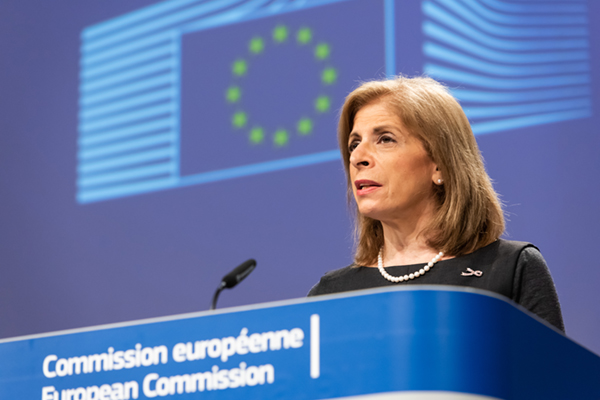
European Health Commissioner Stella Kyriakides | Source: EC - Audiovisual Service
In an attempt to remedy the shortfalls in supply of the vaccine in the EU, the Commission on Friday announced plans to restrict exports of the vaccine from EU member states. As part of this measure, it proposed triggering Article 16 of the Protocol on Ireland/Northern Ireland to restrict exports of the vaccine from Ireland to Northern Ireland. Northern Ireland would be considered an export territory for vaccines sent from the EU. This measure was because of the Commission’s concerns that NI could be used as a ‘backdoor’ to send supplies to the UK. Given that Northern Ireland’s vaccine comes from the rest of the UK, the move was unlikely to disadvantage NI in terms of its vaccine supply, but the plan has been described as “politically explosive” and a “fiasco”. Former Northern Ireland Secretary of State Julian Smith MP said “the EU cocked up big time”.
'(16) Exports of goods from Northern Ireland to other parts of the United Kingdom cannot be restricted by Union law unless this is strictly required by international obligations of the Union. Therefore, movements of goods covered by this Regulation between the Union and Northern Ireland should be treated as exports. Whilst quantitative restrictions on exports are prohibited between the Union and Northern Ireland, in accordance with Article 5 (5) of the Protocol on Ireland/Northern Ireland, this is justified as a safeguard measure pursuant to Article 16 of that Protocol in order to avert serious societal difficulties due to a lack of supply threatening to disturb the orderly implementation of the vaccination campaigns in the Member States.'
Friday’s proposed European Commission regulation to control vaccine exports, which has been redrafted
The move by the Commission prompted unanimous indignation in Northern Ireland, Ireland, and the UK. The Irish Government was ‘blindsided’ by the move, having not been notified prior to its announcement. The Irish European Commissioner Mairead McGuinness said the matter had not been brought to her attention in advance.
The five main political parties in Northern Ireland were united in their condemnation of the issue. The DUP and UUP took the opportunity to call on the UK government to use Article 16 to protect NI’s interests which they see as being damaged by the Protocol.
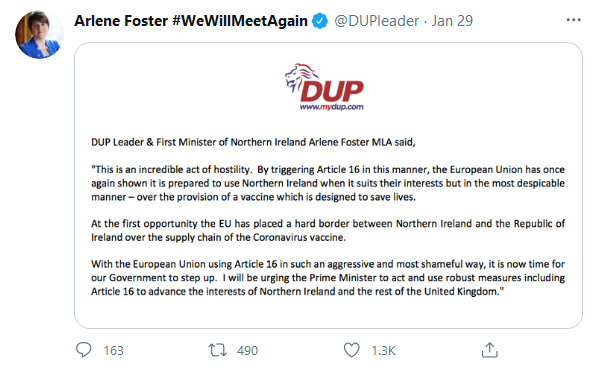
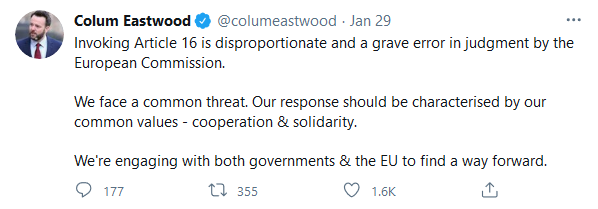
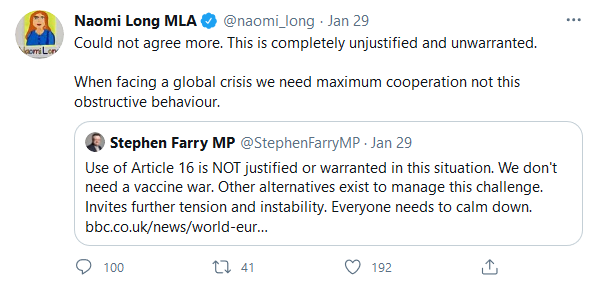


Leaders of the five main parties express concerns about the EU’s intention to trigger Article 16. | Source: Twitter
Prime Minister Boris Johnson and Ireland’s Taoiseach Micheál Martin spoke separately to European Commission President Ursula Von der Leyen on Friday to express their concerns about the move. EU sources have described the move as an “oversight”. The Commission then made an abrupt U-turn, releasing a statement saying that the final measure to implement authorisation of vaccine exports will ensure that “the Ireland / Northern Ireland Protocol is unaffected”, highlighting that “the Commission is not triggering the safeguard clause.” The Commission however stated that “the EU will consider using all the instruments at its disposal.”
Von der Leyen tweeted that she had “constructive” talks with PM Johnson and that they “agreed on the principle that there should not be restrictions on the export of vaccines by companies where they are fulfilling contractual responsibilities.”
The incident has been widely criticised: Commissioner McGuinness acknowledged this, saying "I put my hands up on behalf of the Commission, this has not been good for the European Commission." The Commission insists its temporary measure is not a ban, but it would require notice and authorisation for vaccines to be exported outside the EU. Chancellor of the Duchy of Lancaster Michael Gove, who holds responsibility for EU relations in the UK Government, stated that the UK had also not been consulted on triggering Article 16 (something the EU is required to do under Annex 7 of the Protocol). Gove stuck a conciliatory tone, stating that “we need a reset” and that the EU recognises it “made a mistake”. This morning when questioned about the Article 16 incident, the EU Commission spokesperson said “only the Pope is infallible” and that “mistakes can happen”.

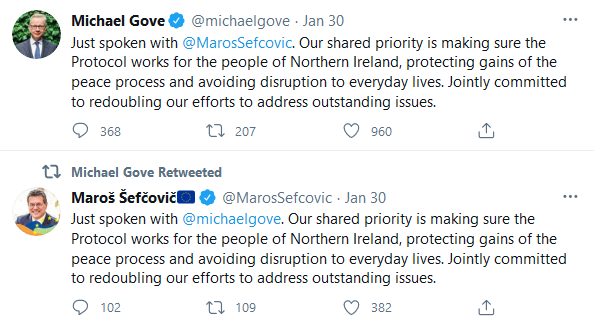
Taoiseach Micheál Martin, Chancellor of the Duchy of Lancaster Michael Gove, and Vice-President of the European Commission Maroš Šefčovič made statements on the Protocol. | Source: Twitter
This morning, leader of the TUV Jim Allister, tabled a ‘Matter of the Day’ at the Northern Ireland Assembly on the EU proposal to invoke Article 16. He spoke of the “callous self-interest of the EU”. First Minister Arlene Foster said the move was “wrong”, “unnecessary”, and that “this was no accident”. John O’Dowd of Sinn Féin called for “calm heads”. He said the EU Commission was wrong, but called for outstanding issues to be resolved through working with the Dublin and British governments, and the EU. The SDLP’s Matthew O’Toole said it was concerning that the incident over the Protocol had happened in the first place.
Junior Ministers update MLAs on EU Exit
On 27 January, Junior Ministers in the Executive Office, Gordon Lyons (DUP) and Declan Kearney (Sinn Féin), briefed the Committee for the Executive Office on EU Exit matters. Lyons said the Executive Office’s key focus is “securing the best possible outcome” in relation to Brexit.
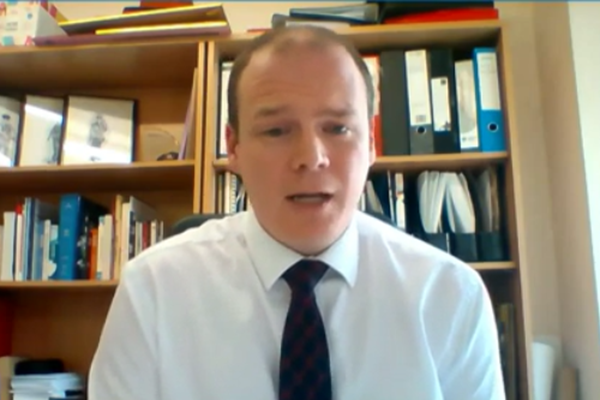
Junior Minister Gordon Lyons speaking to the Committee | Source: NI Assembly
Kearney noted that since the end of the transition period there have been some “operational issues” including disruptions and reductions in some product lines at shops. He noted, "it is vital that we ensure that they are ready for the end of the grace period". Lyons stated that the “biggest concern we have right now” is the end of the grace periods.
There was some disagreement, both between Committee members and between the Junior Ministers, about what precisely should be blamed for the problems: Brexit itself, or the Protocol. Lyons argued that the problem with trade in goods are due to the Protocol and the regulatory border down the Irish Sea, adding “the Protocol is not a good outcome for Northern Ireland”. Kearney pointed out the Protocol exists because of Brexit, and that opportunities were offered to the British Government by the European Commission, such as an extension of the transition period, which could have given more time for preparations.
Kearney said that no one really knows what the mid to long term consequences of the new trading barriers will be, while Lyons called for common sense to be shown for goods moving GB-NI, which have no risk of entering into the EU. Kearney said we are in “new unchartered territory”: officials are still working out the consequences of the Trade and Cooperation Agreement. He said it is essential to have regular intensive engagement with UK and Irish officials, and with the European Commission.
PSNI Assistant Chief Constable gives evidence to MPs
On 27 January, the House of Commons Northern Ireland Affairs Committee heard evidence from Assistant Chief Constable of the Police Service of Northern Ireland (PSNI) Mark McEwan on cross-border co-operation on policing, security and criminal justice after Brexit. McEwan told MPs that there are “signals” of “growing discontent” among loyalist communities in relation to the Protocol on Ireland/Northern Ireland, seen in graffiti and on social media. He added that this is not causing significant concern to the PSNI at the moment, but the force is monitoring the situation and is prepared with contingency plans should this manifest in protests or disruption at ports. He suggested the pandemic could be "moderating people's behaviour in terms of the desire to protest". SDLP MP Claire Hanna said it is important we do not talk up trouble “at a very tense and difficult time”.
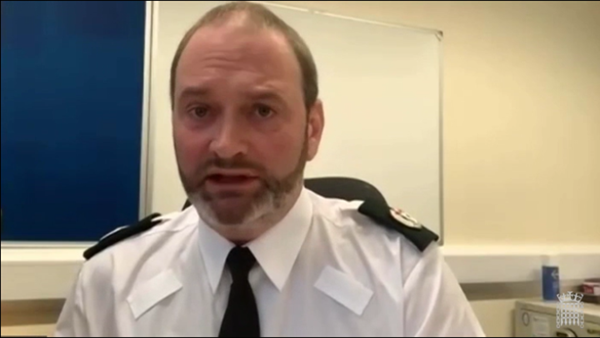
Mark McEwan speaking to the Committee | Source: UK Parliament
McEwan also spoke to the Committee about the implications of losing access to the European Criminal Records Information System (ECRIS), data adequacy agreements, and extradition arrangements after Brexit.
New system for ‘groupage’ established
The UK Department of Environment, Food and Rural Affairs (Defra) and Northern Ireland’s Department of Agriculture, Environment and Rural Affairs (DAERA), in cooperation with hauliers, have established a new system for mixed food consignments, known as ‘groupage’. Since the end of the transition period, the new regime for moving food products has caused problems for hauliers who transport goods from different companies in one load: trailer seals would have to be broken and goods recertified each time items are added to the load. The new system will require pallets to be securely sealed under official supervision.
Committee for Infrastructure hears implications of Brexit
On 27 January, the Committee for Infrastructure heard from departmental officials who told MLAs that the EU-UK Trade and Cooperation Agreement recognises many of the unique circumstances of Northern Ireland. The TCA terms ensure hauliers and bus operators can continue to access the EU – hauliers won’t need entry permits, and transit through EU member states is also permitted. There are provisions for cabotage (the transport of goods/passengers between two places in the same country by a transport operator from another country) for hauliers and bus operators on the island of Ireland. UK driving licence holders will be able to use their licences in the EU without additional documentation. Green cards – proof of vehicle insurance - will be required for drivers travelling into the Republic of Ireland, but not vice versa.
The official said they were “relieved” that a lot of key concerns of the Department were provided for in the Trade and Cooperation Agreement. The TCA was “good news” in that road haulage permits, cabotage, and cross-border bus services issues were addressed. There have been unexpected consequences such as the tariffs on steel, which would have affected the ability of the Department to order steel for new road signs – this has been resolved. However, the Committee was told that unanticipated issues are coming out of the woodwork and this may be the case for some time. When hospitability and retail sectors open again and a greater flow of goods is required, there could be a greater impact.
Other news
- PM Boris Johnson has appointed David Frost his Brexit and International Policy Representative and head of a new International Policy Unit at Downing Street. Frost was the UK’s chief negotiator for trade negotiations with the EU. Number 10’s press release said Frost has been asked to “to help drive through changes to maximise the opportunities of Brexit”. Frost had previously been appointed as National Security Adviser; this role will now be taken up by Sir Stephen Lovegrove.
- The Department for Agriculture, Environment and Rural Affairs confirmed flexibilities for pet checks have been extended to 1 July 2021 to allow pet owners to adjust to the new regulations in an ‘education phase’. Agriculture Minister Edwin Poots has called for a ‘Common Travel Area for pets’ between the UK and Ireland, and has called the checks on pets moving GB-NI “absolutely needless and unnecessary”. A working group has been established between the UK Cabinet Office and Ireland’s Department of the Taoiseach, to consider how best to mitigate the effects of the new requirements.
- Concerns have been raised about the Protocol on Ireland/Northern Ireland’s impact on movement of military equipment. UUP MLA Doug Beattie says that the Ministry of Defence must now complete customs declarations and give 15 days’ notice to move equipment GB-NI. A NATO 302 form may also be required. A spokesperson for the Ministry of Defence said the Protocol “has not placed any limitations on the Ministry of Defence's ability to conduct operations”.
This Week at the Assembly
- Tuesday 2 Feb, 9 AM - Committee for Economy - Departmental Briefing – EU Exit Update
- Tuesday 2 Feb, 10 AM - The Committee for the Executive Office is engaging with the Seanad Special Select Committee on the Withdrawal of the UK from the EU.
- Wednesday 3 Feb, 10.40AM - Committee for Infrastructure - Departmental Briefing on Common Frameworks
- Wednesday 3 Feb,3:45 PM - Committee for Finance - RaISe Oral Briefing on Freeports and State Aid
- Thursday 4 Feb, 9.45AM - Committee for Health - Briefing from Food Standards Agency on Common Frameworks (Food and Feed Safety and Hygiene, and Nutrition Labelling, Composition and Standards)
- Thursday 4 Feb, 10 AM Committee for Agriculture, Environment and Rural Affairs - Oral Evidence from DAERA on implications of EU Exit for local fishing fleet; EU Exit legislation
Catch up with the Committees
- Wednesday 27 January, 10am - Committee for Infrastructure - Departmental Briefing – Brexit
- Wednesday 27 January, 2pm - Committee for the Executive Office - Oral evidence session with Junior Ministers on Brexit issues
- Wednesday 27 January, 2pm - Committee for Finance - Public Procurement Common Framework - Oral Evidence from the Department of Finance
- Thursday 28 January, 10am - Committee for Agriculture, Environment and Rural Affairs - EU Exit legislation
- Thursday 28 January, 2PM - Committee for Justice - Consideration of EU Exit legislation



